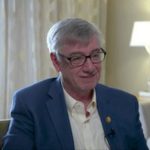How can we get help to maintain a migraine friendly diet?
Description
A one-time consultation with a nutritionist can help with a migraine-friendly diet. It’s a good idea to talk with friends and family to make a shared commitment to eat a healthy, low-glycemic diet.
Transcript
“So a couple things that people have done is, that we do have a nutritionist at Mayo Clinic so we'll sometimes refer our patients for a one time consultation with a nutritionist, which can be very, very helpful. But the other thing that I've found that my patients have told me is that if they actually talk to some of their friends or family that also have migraine and they all kind of make a commitment to each other to try to practice a low glycemic index diet, or engaging the family so that the entire family's diet becomes a little bit more healthy, it helps not only the individual with migraine but it also ends up helping the family members as well.”
Discussion
The paragraph of discussion is to explain in plain language what the speaker is discussing in his clip and provide any necessary context to help improve understanding. Take as long as you need to clearly explain the context and content of the video transcript while being concise and to the point.
This is a short segment of a full video interview. View the full version by upgrading to an Access Pass bundle! Get FREE access to 8 expert interviews from Day 1 and Day 2 when you register today!

Amaal J. Starling, MD, FAHS, FAAN
Neurologist
Mayo Clinic, Arizona
Dr. Amaal J. Starling is an associate professor of neurology at the Mayo Clinic College of Medicine. She joined the Mayo Clinic in 2012 and is currently a consultant within the Department of Neurology. Dr. Starling received her medical degree from the Drexel University College of Medicine in Philadelphia. She completed a transitional year residency, a neurology residency, and a headache fellowship at the Mayo Clinic College of Medicine in Scottsdale, Ariz.
Dr. Starling is an active member of numerous migraine advocacy organizations, including the American Headache Society (AHS), the American Migraine Foundation, and the American Academy of Neurology (AAN). She is also involved in events supporting migraine, including Headache on the Hill, Miles for Migraine, and the Alliance for Headache Disorders Advocacy. Dr. Starling is currently serving on the AHS Board of Directors and is the chair of the AHS Advocacy Committee and a member of the AHS Diversity, Equity, and Inclusion Taskforce. Dr. Starling has been the recipient of numerous awards, including the AHS Above and Beyond Award for Service, Manfred D. Muenter Award for Excellence in Clinical Neurology, the AAN Annual Meeting Residency Scholarship, the 2012 Spirit of Mayo Clinic Award, and the Mayo Brothers Distinguished Fellowship Award.
Dr. Starling has authored numerous peer-reviewed publications and abstracts related to her fields of interest, which include migraine, concussion, post-traumatic headache, neuromodulation, and telemedicine. Dr. Starling’s hope is that her research and advocacy will advance care for people with migraine, post-traumatic headache, and other headache disorders. She envisions a future in which all people with headache disorders receive personalized, effective, and well-tolerated treatment options to improve their quality of life.
Interviews from Amaal J. Starling, MD, FAHS, FAAN
SEEDS Natural Method for Migraine Control
Treatment Spotlight: Drug-Free Devices
When Nothing Works: Treatment-Resistant Chronic Migraine
How Can You Stand Up Against Migraine?



